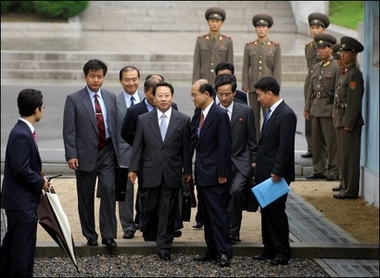Envoys discuss aid for NKorea in group talk
(agencies)Updated: 2007-08-07 14:43 PANMUNJOM, South Korea -- Envoys from six nations gathered Tuesday at the border truce village of Panmunjom to discuss the next steps in North Korea's denuclearisation, in what South Korea termed a historic meeting.
 Korean Lim Sung-Nam(2nd R), Ambassador for North Korean Nuclear Issue waits prior to the second Economy and Energy Cooperation Working Group Meeting at Panmunjom, 07 August 2007.[AFP]  |
"This truce village symbolises a particular legacy of division of the Cold War which I believe should be remedied through the peace process to proceed in parallel with the denuclearisation process."
The working group meeting is one of several scheduled for August after the communist North last month shut down plants at Yongbyon which produced plutonium for its nuclear bombs.
The shutdown, the first step in a six-nation nuclear disarmament deal, was rewarded with 50,000 tons of heavy fuel oil from South Korea.
If the North declares and permanently disables all its nuclear facilities, it will receive another 950,000 tons of oil or equivalent aid.
It will also get major diplomatic and security benefits, such as normalised relations with its old enemies the US and Japan.
The Panmunjom meeting will decide just how to deliver the promised economic reward to the impoverished North, which suffers acute power shortages but also lacks infrastructure to handle a huge heavy fuel oil shipment.
The six-party talks assumed greater urgency after the North tested its first nuclear weapon last October. In February they agreed a deal but progress was delayed for months by a now-resolved dispute over US financial sanctions.
"After many twists and turns, the six-party process has gained momentum again," Chun told the meeting in the village's House of Peace just south of the inter-Korean border.
"Sceptics have lost their bet."
Chun, the South's chief nuclear negotiator, cautioned that future negotiations would be "more difficult and challenging."
He said the central task "is to work out the most cost-effective and feasible package of options" regarding energy or alternative aid.
Chun also said there could be "obstacles and pitfalls" despite rising expectations for speedy progress.
The US has said that a permanent shutdown of North Korea's nuclear programme, which the North has pursued for decades, is possible this year.
The Seoul envoy told reporters before the talks that each side would be able to "spell out what they want in detail and hold substantial discussions. We can call that big progress."
A lack of oil storage tanks is a potential problem.
"We want to give the oil to North Korea as quickly as possible but paradoxically it cannot afford to take it all," a Seoul official engaged in the six-party talks told AFP last month.
Yonhap news agency quoted an unidentified official as saying Monday that the North can only accept up to 200,000 tons of heavy fuel oil a year.
It said one possible option could be to issue "credit or promissory notes" for North Korea to buy heavy fuel oil at its convenience.
At previous talks the North proposed that the five other countries help expand its oil storage facilities and repair power plants, it said.
Splitting the bill for the oil could be contentious. Japan refuses to contribute until the North accounts for alleged Japanese hostages in the communist state.
"Unless progress is made on the abductions and other issues, Japan will never give anything," Foreign Minister Taro Aso told reporters in Tokyo.
The US insists on providing heavy fuel oil rather than refined products which could be used by the military.
The North also wants heavy oil since it was part of an aborted 1994 agreement even though it is of limited use, according to a May report by the US-based Nautilus Institute.
Only a limited number of its power stations can burn the heavy
oil.
|
|
|
||
|
||
|
|